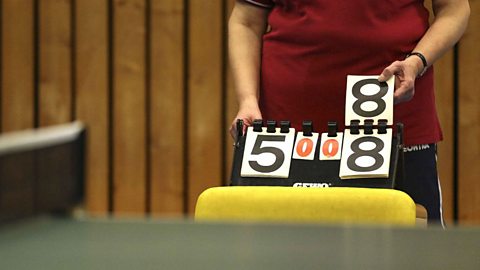Table tennis scoring, rules and officials
Scoring
A competitive game of table tennis is played to the best of five or seven games. The first player to get to 11 points in a game is the winner. However, if a game is tied at 10-10, a player must win a game by two clear points. You do not lose service if you lose a point - each player must serve for two points in a row before handing the service over to their opponent.

Rules
- To start a point, the server must stand at the back of the table and can serve either forehand or backhand. The ball must be thrown up either equal to or above the height of the net before striking the ball and the ball must be thrown from an open palm to stop finger spin.
- If the ball hits the net on a serve but continues over the other side then a 'let' is played.
- Players are allowed to hit the ball around the side of the net.
- The ball must bounce on a player's side of the table before playing their shot.
- During play, competitors are not allowed to touch the table with their non-bat hand. If they do, the point is conceded.
- Players must swap ends at the end of a game, and in the final match players will switch ends after five points.
Officials
For every table tennis competition, a referee is appointed with a deputy who can act on their behalf. The referee is required to be present at the venue throughout a tournament and is required to uphold the rules.
During a table tennis match, an umpire is appointed to decide on the result of each point or rally. The umpire is required to use their judgement when applying the laws and regulations of the ITTF. Where the umpire is officiating alone, their decision is final and they should be seated about 2–3 metres from the side of the table and in line with the net.